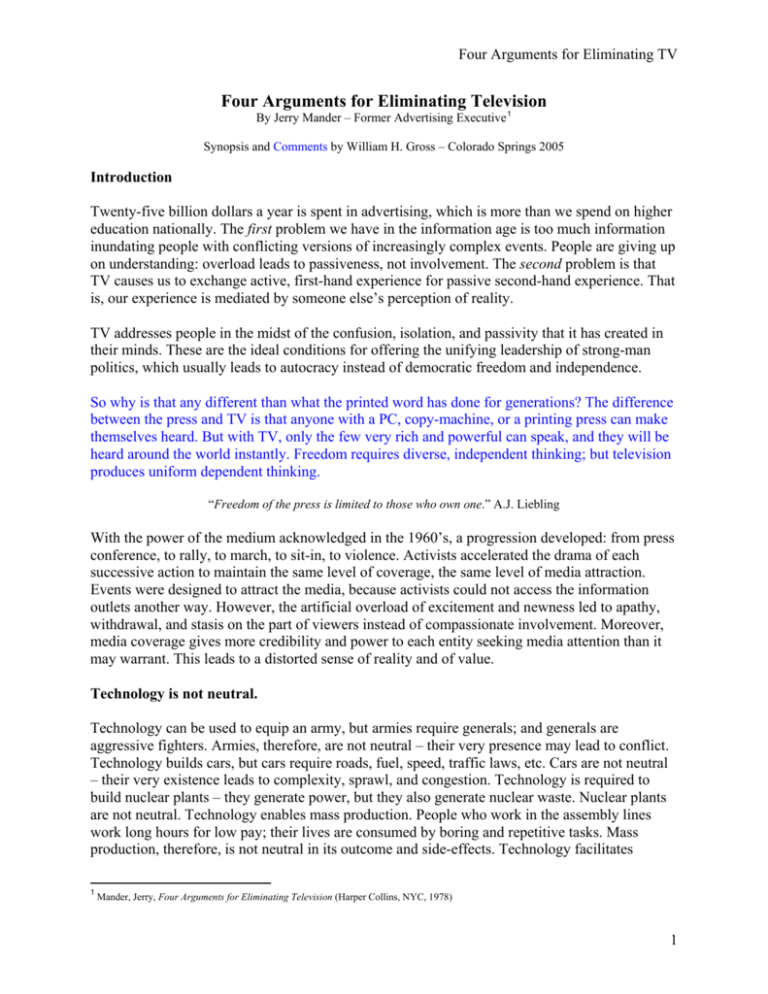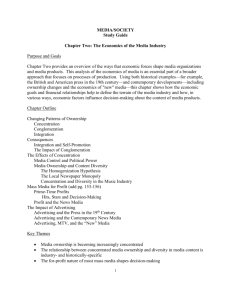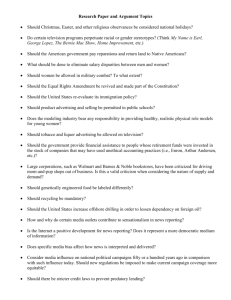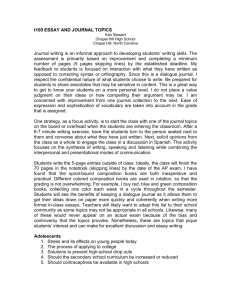Four Arguments for Eliminating Television
advertisement

Four Arguments for Eliminating TV Four Arguments for Eliminating Television By Jerry Mander – Former Advertising Executive 1 Synopsis and Comments by William H. Gross – Colorado Springs 2005 Introduction Twenty-five billion dollars a year is spent in advertising, which is more than we spend on higher education nationally. The first problem we have in the information age is too much information inundating people with conflicting versions of increasingly complex events. People are giving up on understanding: overload leads to passiveness, not involvement. The second problem is that TV causes us to exchange active, first-hand experience for passive second-hand experience. That is, our experience is mediated by someone else’s perception of reality. TV addresses people in the midst of the confusion, isolation, and passivity that it has created in their minds. These are the ideal conditions for offering the unifying leadership of strong-man politics, which usually leads to autocracy instead of democratic freedom and independence. So why is that any different than what the printed word has done for generations? The difference between the press and TV is that anyone with a PC, copy-machine, or a printing press can make themselves heard. But with TV, only the few very rich and powerful can speak, and they will be heard around the world instantly. Freedom requires diverse, independent thinking; but television produces uniform dependent thinking. “Freedom of the press is limited to those who own one.” A.J. Liebling With the power of the medium acknowledged in the 1960’s, a progression developed: from press conference, to rally, to march, to sit-in, to violence. Activists accelerated the drama of each successive action to maintain the same level of coverage, the same level of media attraction. Events were designed to attract the media, because activists could not access the information outlets another way. However, the artificial overload of excitement and newness led to apathy, withdrawal, and stasis on the part of viewers instead of compassionate involvement. Moreover, media coverage gives more credibility and power to each entity seeking media attention than it may warrant. This leads to a distorted sense of reality and of value. Technology is not neutral. Technology can be used to equip an army, but armies require generals; and generals are aggressive fighters. Armies, therefore, are not neutral – their very presence may lead to conflict. Technology builds cars, but cars require roads, fuel, speed, traffic laws, etc. Cars are not neutral – their very existence leads to complexity, sprawl, and congestion. Technology is required to build nuclear plants – they generate power, but they also generate nuclear waste. Nuclear plants are not neutral. Technology enables mass production. People who work in the assembly lines work long hours for low pay; their lives are consumed by boring and repetitive tasks. Mass production, therefore, is not neutral in its outcome and side-effects. Technology facilitates 1 Mander, Jerry, Four Arguments for Eliminating Television (Harper Collins, NYC, 1978) 1 Four Arguments for Eliminating TV advertising, which has the sole purpose of influencing consumers. Advertising is not neutral. It is designed to dominate the mind by changing thinking patterns. Television is the primary medium for advertising. Television, which is itself a pervasive and powerful technology, not only carries advertising, news, and cultural images, but it also pre-determines who will use it, how they’ll use it, and what effects it has on individual lives. It determines what forms political activity will take. TV is not and cannot be a neutral technology, nor does it convey a neutral message. It has the power to influence large portions of the population using surreptitious psychology and inherent technology to achieve its owners’ purposes and to promote their agenda. The medium by its very nature consolidates power and influence into the hands of a rich few. There is no democratic process by which voters and consumers may directly affect its content, or control its impact. The problems and the dangers of television are inherent in the technology itself. That means it cannot be reformed in its nature as a medium. And because the medium of television cannot be reformed, it needs to be eliminated. What follows are four fundamental arguments offered in support of eliminating television. Argument 1 – TV conditions us to accept someone else’s authority. Artificial environments deprive us of a direct knowledge of nature. Our knowledge is limited to the created environment , and so we know only what we are told by “the creator” of that environment. Whoever controls the creative process, defines reality for everyone else. We become subject to the creator, and the “confinement of our experience” becomes the basis of the creator’s power over us. Technocrats expropriate knowledge and claim it as their restricted domain by controlling the content of that knowledge, and the medium through which it is conveyed to us. This forces us to abdicate our own experience in favor of the opinion of the “experts,” self-declared though they may be. We are effectively silenced before the television screen. There is no dissent allowed, and no debate possible. That means any search for truth is necessarily curtailed by the medium. Discovery of truth cannot be made in a rush – it requires time, patience, and observation. TV undermines the very foundation of discovery and perseverance. The normal path of learning in a pre-technical society is for individual observation. We then share our individual observations in a group, and have them assessed by the leader(s) or other impartial observers. We then inform all observers of the conclusions. There is no group involvement in television, no chance to be heard, no interactive wrestling with the issues, and the clock is always running, cutting short the discussion and the examination of what is true. 2 How exactly do we examine truth and reality? In meditating on an experience, the subconscious is strongly relied on to bring to the surface those things observed but not acknowledged by the conscious mind. But in technological societies, the subconscious is scoffed at as “unscientific.” Its citizens compartmentalize their knowledge and bury themselves in detail. They sterilize their environments instead of interacting with them, and by doing so they atrophy their senses by failing to stimulate them equally. 2 The selection of speakers, the sources for the “truth” presented, is biased toward generating controversy and conflict, not balance or fairness. 2 Four Arguments for Eliminating TV This idea of perception and analysis being more than surface facts and cognitive functions carries over to education. Education is not entirely objective, quantifiable, and verbal. Textbook learning is only a small part of our overall education. Education is not just cerebral, it is also sensory, and our environment has as much to teach us as “empirical, objective processes.” Television is not a medium of education as much as it is an environment in which we are educated. When we move knowledge away from direct experience and natural sources, and come to rely on second-hand “expert” knowledge through a presentation, we know only what we’re told and we begin to discount our own experience. TV is entirely second-hand. We wind up living in an artificial environment, an interpretation of reality that has no direct link to objective physical reality. We may substitute our own interpretation, or we may even reject the expert interpretation – either way, society considers such rejection to be schizophrenic. And either way, the focus and the content of the conversation is controlled by the expert. We are merely responding to and not initiating the conversation, because TV does not permit us to initiate anything. Its nature is to have and to produce a passive and receptive audience. In George Orwell’s 1984, it was crucial to destroy print media or there could be no control of the past. The party slogan was, “who controls the past controls the future; who controls the present controls the past.” The party told everyone to ignore their eyes and ears and listen only to the party, the “experts.” In Brave New World, Aldus Huxley paints a similar picture where corporate managers and engineers control “truth” and the people are conditioned to seek self-gratification of things easily supplied by the social engineers. TV by its nature generates confusion: in its interspersed advertising, its format, its contradictory moral tales, and its competing channels with their competing views on every topic. To deal with confusion, power has to be centralized and government control increased. Confusion works to its advantage. To be effective workers, the population must be willing servants of the government. Toward this end, any government which seeks control over its people must confine their experience and awareness to pre-determined patterns which it defines. It sets up a straw man of mayhem, anarchy, and danger, and then it offers its protection and its comforting order to those who have been taught to fear the straw man. Governments seldom seize power. They are usually granted power, by the population. Television offers too convenient a technology for this process. Eight Conditions for Autocracy to Flower – Look familiar? 1. Eliminate personal knowledge 2. Eliminate points of comparison 3. Separate people from each other 4. Unify everyone’s experience 5. Occupy the mind with distractions 6. Encourage drugs and conflict 7. Centralize knowledge and information 8. Redefine happiness and meaning Argument 2 – TV facilitates consolidated power through the colonization of experience. Technological advances by their nature are controlled by those who controlled the previous technologies because of their existing power, position, and access. This leads to consolidation and dominance in new fields. Those who controlled the presses, the banks, and manufacturing plants of prior generations now control television and advertising in the new generation. 3 Four Arguments for Eliminating TV The biggest single difference between the Depression of the 1930’s and the economic expansion of the 1950’s was not the state of the economy, but the consolidation of wealth and power in the hands of a few corporations. With their influence came a TV-based promotional for conspicuous consumption to keep the expansion going. In the end, such an expansion cannot be sustained. The power of national corporations has spawned not just international, but multi-national corporations which have no respect for or obligation to the nations which created them. TV has made it possible for such corporate giants to maintain good relations with consumers and voters even as they usurp individual freedoms and rights. 3 And the means of such influence-peddling has been television. Network television is the creature of 100 companies, which in 1960 accounted for 83% of all TV advertising. As for “public” TV, in 1975 the same 100 companies paid for 40% of all programming. In 1974, the same 100 companies accounted for 55% of all advertising in all media. That’s 100 corporations out of 400,000 corporations. TV is mass technology available to all who want to view it, but to only a few who want to control it. The Motive - In free enterprise, value is assigned to producible goods and services. Thus, things are considered to have no value if they cannot be made productive, i.e. if they cannot generate revenue. Undeveloped land is non-productive; uninhabited desert is non-productive; uncut forests are non-productive. Therefore the economic system itself has a vested interest in turning the natural into the artificial; anything less outrages the capitalist. Open space, untamed animals, and untapped minerals are searched out and transformed, if only to the temporary benefit of the transformer and the long-term liability of society. The profit motive tends to be short-term and short-sighted. Scarcity is valued because it drives up profits. It is not to be overcome; it is to be taken advantage of: it’s all about private enterprise, and it’s all about now. The next generation will have to pick up the pieces of what we leave behind; it’s their problem. There is an old story of a native living on a Pacific island, relaxing in a house on the beach, picking fruit from the tree and spearing fish in the water. A businessman arrives on the island, buys all the land, cuts down the trees, and builds a factory. Then he hires the native to work in it for money so that someday the native can afford canned fruit and fish from the mainland, a nice little cinder-block house near the beach with a view of the water, and week-ends off to enjoy it. The story of the native is a parable for all of us who have lost control over obtaining the necessities of life. The opportunity for profit arises from the act of separating us from that control. If we cannot provide for ourselves, then we must pay another to do it for us. If we can provide necessities for ourselves, then we must be conditioned to desire non-necessities that we cannot obtain or create ourselves. What has all this got to do with television? TV is the primary medium of advertising. It is designed to convert us into consumers of anything and everything. It uses our experiences, 3 Consider the TeleCommunications Act of 1996 which gave the public airwaves to private individuals. Consider the recent U.S. Supreme Court decision which gave eminent domain rights to private corporations. The government is now free to take any citizen’s property and give it to private companies as long as there is some general economic benefit (loosely defined) for the community! Kelo v. City of New London (04-0108). 4 Four Arguments for Eliminating TV feelings, perceptions, behaviors, and desires to convince us of our incompleteness and inadequacy, so the transformer can make us complete and adequate with his product or service. We become no different than a chimpanzee in a lab that has been removed from his natural environment. He is supplied with buttons to push to provide himself with food, water, and occasional companionship. The effect on the chimp is to make him lethargic and suicidal. His choices are limited to what his captors offer. He reduces his own mental and physical expectations to fit what can be gotten, and he becomes addicted to whatever experiences remain available to him. If he cannot adapt this way, then he goes crazy, he revolts, or he dies. The purpose of advertising is to unify and homogenize people and culture. The fact that you choose a Ford and I choose a Volvo doesn’t mean diversity; it means unity. We agree that we need a car that is essentially identical in everything but style. And even the style difference is nominal. TV is both a commodity and a vehicle of advertising. It identifies community-wide needs and it calls us to action. It defines our inadequacy and supplements our short-comings. It is the great oracle supplying answers to questions it posits itself. And it is the great confiner, encouraging us to separate ourselves from interaction with family, friends, and community even as they sit in the room with us. It is advisor, teacher, guide, and advocate, controlled by the few over the many. Advertisers are “colonizing” us through our mutual experience of their artificially created environment. In essence, they invade our living rooms and bedrooms through TV, demanding our attention and devotion to their message. And we naively give it to them. They tell us we are weak and needy, or we are strong and powerful. Either way we believe them. So when they offer us an appropriate response in the form of a consumable product or service, we gratefully comply by purchasing it, saying, “What a good boy am I.” Argument 3 – TV physically conditions us for authoritative rule Here are some phrases commonly used to describe watching TV. It’s a hypnotizing, energysucking, brain-washing, vegetative, concentration-killing, addictive, zombie-like, minddestroying, mind-numbing dream-state that is a stupefying, cognition-killing, mesmerizing, colonizing, isolating, meditative, and yet somehow relaxing activity. And so we like it. NIH did a 3-year $5 million study on the effects of TV. TV was found addictive and hypnotic. It stops thought similar to brain-washing; the study also noted other physical effects. The President suppressed the study and commissioned another group to re-do it. In 1977, Marie Winn wrote a book with anecdotal evidence of TV’s effects called “The Plug-In Drug.” It asserted that TV viewing by children was addictive, turning them into passive, incommunicative “zombies” who couldn’t play, couldn’t create, and couldn’t think clearly; they couldn’t solve problems and couldn’t fill their free time. It broke down family communication, and filtered even direct affection through the TV, to everyone’s harm. It is an instrument of “fixation technology,” and it aids in implanting imagery in the viewer. What exactly is “fixation technology?” 5 Four Arguments for Eliminating TV Fixation Technology Fixation technology is a system of mind stimulation that induces a psychological fixation on some topic or object to the exclusion of independent and critical thought about it. This is done by controlling the viewing and experiential environment through selective sensory deprivation. OK. But how is TV an instrument of fixation technology? Consider that it is viewed in dimmed or darkened rooms with external noise suppressed, external movement suppressed, with the body stretched out. Arms, legs, and head are propped and cushioned. The heartbeat slows to idle; the pulse rate evens out; brain-wave activity drops to an alpha-state; cognitive thinking diminishes; the eyes move less as they stare at a fixed point of light; and focusing ceases. All information flattens to a single dimension. Hearing is limited while smell, touch, and taste are virtually eliminated. That’s the viewing environment for television. So what? What’s the harm? There is mounting evidence of the physical effects of TV-watching. The images induce a stimulus to move, and then that stimulus is cut off. This repeats with each image, inducing the body to store un-released energy. Once the TV is turned off, the body releases its pent-up energy in a burst of hyper-activity: outward, aimless, random, speedy activity. It’s fast movement with no purpose, often leading to violence. TV is sensory deprivation of a sort, little different than the floating tank experiments. It leaves us open to suggestion, which is the foundation of hypnosis. No light is passive in its effect on us. Even natural light affects our body clock, and our health. Light rays pass from the retina to the brain. Then via the pineal and pituitary glands, its effects pass to the cells affecting hormones, sexuality, fertility, growth, etc. Light is nourishment to animals as well as plants. Light causes a resonance in the foods and additives we eat – food coloring, for example, is activated by particular spectra of light. 4 Now consider that TV light is not natural light. It is not ambient light. It is purposeful and directed. It enters our body just as food and water do. TV provides a dominant light source, and we are passive as we receive its images. The light is fluorescent. It alters the physiology of the cells in the body, just as fluorescent lights alter the cell chemistry in plants. 5 In rats exposed to fluorescent light, pink light induced cancer in 40% of them, white in 6% of them, other colors in 12% of them. Daylight only did it in 3%. Blue light elevated cholesterol. Red weakened the heart cells. Fluorescent light also stimulates the same pent-up behavior identified with watching TV. Color TV sends out only red, blue, and green light, allowing the brain to interpret the other colors but not receive them, as it would with daylight. The limited spectrum produces all the deleterious effects we know about with red and blue light. It sends its images out 30x per second, which the body records, but the brain can only translate images 10x per second. Dr. Freda Morris of UCLA Medical Psychology Dept. says that because the TV images move faster than the brain can process, it forces the mind to chase after them. This leaves no way of breaking contact with those images. Therefore, there is no way to completely critique the information as it passes in. TV stops the critical processes of the brain. 4 5 Confirmed in Scientific American, July 1975, Dr. Richard J. Wurtman. Dr. John Ott in Health and Lights. 6 Four Arguments for Eliminating TV Another method of hypnosis is called Confusion Induction: giving so much information and so many conflicts that the subject goes on overload until the hypnotist offers a simple instruction that produces a trance. The hypnotist builds attention, involvement, emotion, and expectation which are at last relieved when the instruction comes through. He disassembles the cognitive process, assembles it again according to a desired pattern, and then he instructs the subject. It’s a scientific fact that human beings habituate to repetitive light-stimuli. TV is the perfect source for such stimuli. If habituation occurs, the brain decides nothing of interest is going on and virtually quits processing the data. 6 It is akin to day-dreaming or sleep-walking. The left cortex (area 39) goes on hold. It’s the center of logic, communication, and analysis; it is involved in the integration of sensory data, memory, consciousness, and purposefulness. All of these are suspended during the time we watch TV. It becomes addictive much like taking a sedative. TV addiction may indicate that we’ve become unable to generate our own mental imagery. Reading involves beta-waves, which result from actively processing data. TV involves alphawaves because it transmits huge quantities of information not thought about at the time of exposure. We are not actively processing data. Meditation is different than watching TV, even though it also induces an alpha-state. Meditation is active in the sense that the images are internally generated by the mind, not externally imposed by the TV. The bottom line is that TV is not relaxing. It is exhausting. We may have time out from prior thought patterns in our own interactions with the world, but TV fills our time with someone else’s obsessive thoughts and images. Images established in our mind are the foundations of who we will become. We must control the images in our minds if we are to control ourselves. TV can teach us how to handle specific life problems. But these solutions are the creation of other minds, unrelated to our own personal experience. Nonetheless we accept them as real and factual. As we believe these solutions, we also begin to believe the roles and the plots of TV shows, as if they reflected reality. Critical thinking, even while watching TV, cannot stop these images from entering the brain. They remain there permanently. When we lose control of our images by passively receiving whatever is placed before us, we have lost control of our mind. Being able to control what we read and see is a fundamental liberty that helps us define our individuality. When we watch images which conflict with our beliefs, we tend to succumb to their allure; we adopt those conflicting beliefs as our own. We are socially pressured to know the shows, the plots, and the characters in this fictional TV environment. It has become part of our lore, our social “language” and culture. And so we are habituated by it, and we conform to it. Argument 4 – The inherent biases of TV The technology of TV predetermines the boundaries of its content. Some types of information can be conveyed completely, some partially, and some not at all. The most effective TV messages are linear, gross, and simplified to fit the purposes of its commercial controllers. It is pre-selected material that innately excludes all other material. The act of sitting in front of TV is itself a replacement of our other experiences. Because subtleties do not transmit well, technicians 6 This is how a cat approaches its prey: by becoming motionless until the prey assumes there is no threat, and then it approaches again. 7 Four Arguments for Eliminating TV constantly strive for high-contrast images with low detail. Likewise, the sound is low-fidelity 7 – this indistinctness drives programming choices. Subtleties of emotion cannot be conveyed, so gross emotions prevail: hate, violence, hysteria, jealousy, winning, fear, etc. – thus programming tends to include sports, violence, police action, quiz and game shows, soap operas, and situation comedies; news is all about murder, conflict, war, power, and dynamic leaders. Black and white. It seems obvious to say, but the reflection of life can never convey the essence of life. Some things must be experienced personally. They have an aura that cannot be transmitted electronically. When the aura of life is non-transmittable, TV must transmit that which has no aura: death, decay, and rot. This limited emotional emphasis biases the viewer into believing that life too is simplistic. It is limited to drama, conflict, death, decay, and rot. It instills despair and hopelessness. Our daughters become drama queens, and our sons become the bad boys that all the girls must love. The advertisers need to evoke strong emotions from the viewing audience, not subtle emotions, so they can offer solutions in the form of their products. This creates an unreal and inaccurate reflection of life for the viewer. Condensing life by fore-shortening the time actually spent in an activity is by definition a bias against accuracy. Because the audience is dulled by over-exposure to everything, there is a thrust for the unusual to maintain viewer interest. This artificial unusualness elevates the depicted people or events to a state of “fame” beyond what they merit. It turns rare into common, and by ignoring what is actually common, it makes the mundane things of life seem “unimportant.” Conclusion TV is a non-unique, repetitive task or experience. But within that boredom, the TV producers create the fiction that something unusual is going on – the observation of differences is at the heart of knowledge – and thereby they fixate the viewer. It makes “good TV,” a term applied more to the quality of manipulation than to content. The technique involves creating outrageous imagery, and presenting content outside the norms of life. “Technical events” is the label for such alterations of the natural environment. They must occur 8-10 times each 60 seconds. Such abnormalities induce stress in the viewer by the constant interruption of attention. They also produce an addiction to action, and ordinary life becomes unfulfilling. 8 Advertising must have more technical events than the programming or it will fail: the commercial is the purpose, the program is the package. 9 Advertising therefore has 20-30 T.E.’s per minute. By contrast, public TV (PBS) has 2-3. The simplest way out of this addictive process, and this fantasy realm, is to unplug the TV and put it in the garage or the attic. We mustn’t simply endure the withdrawal from its siren call, because nature abhors a vacuum. We need to replace it. We need to take up reading. 7 This is beginning to change with HDTV and 5-channel sound. It doesn’t alter the psychological impact, however, because subtleties are being replaced with exaggerated complexity. Overloading the images this way produces the same effect of limiting what we can actually process. The cognitive brain throws out most of the background data to focus on the immediate. But the subconscious absorbs the confusion and the conflict intentionally placed in the background and it seeks resolution to it all – at the commercial break, when simplicity returns. 8 Addiction leads to immersion in the habit. To break out of the immersion, simply count the events. That will alienate the illusion. 9 That is, the viewers are the commodity sold to the advertisers for the price of a program. 8








